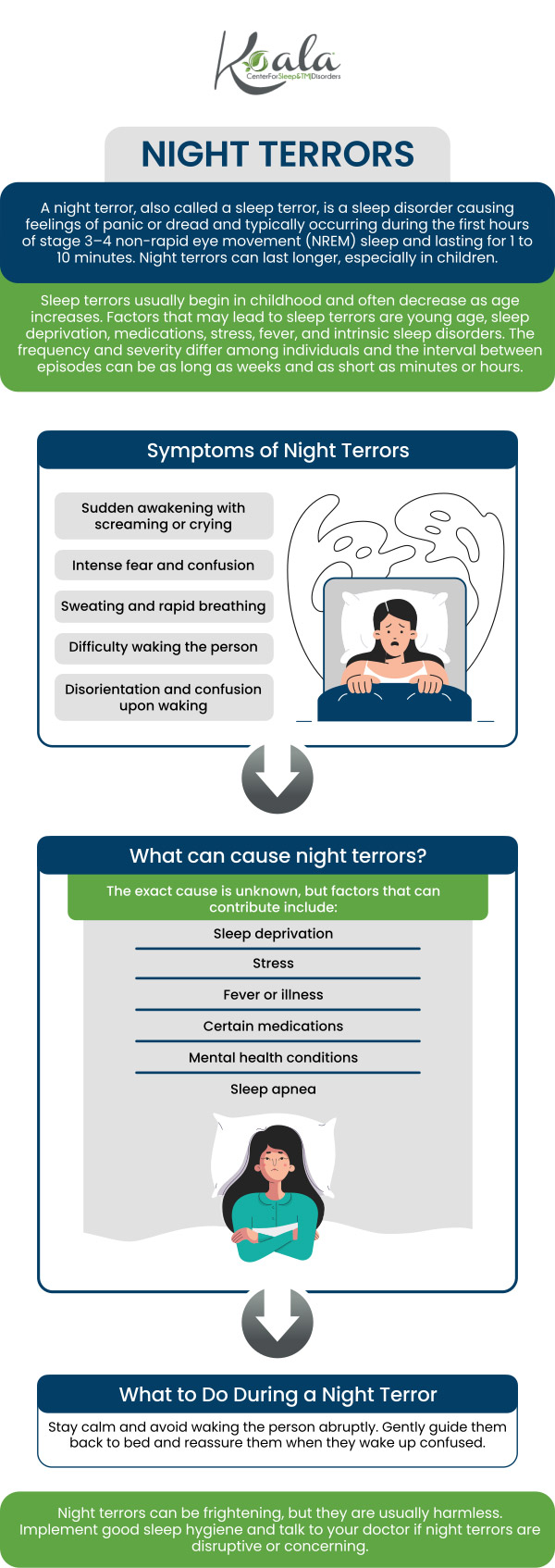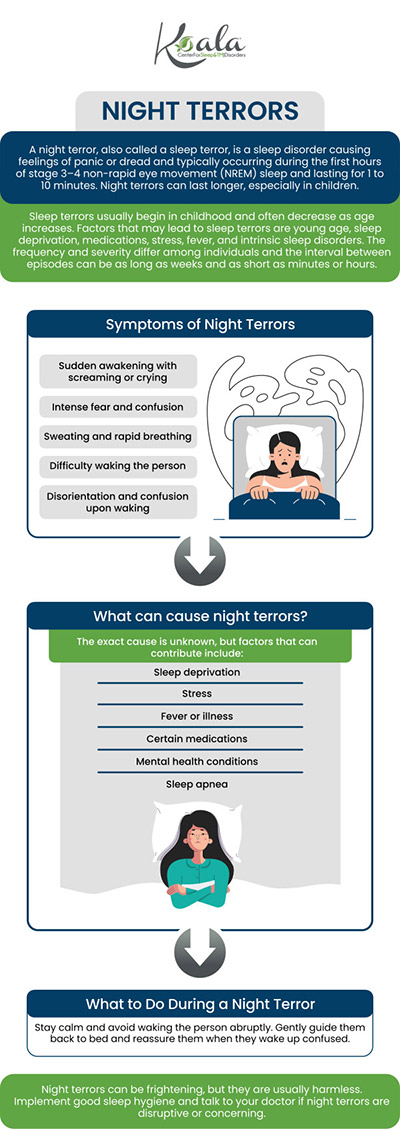Night Terrors vs. Nightmares: Signs, Causes, Tips to Cope
Nightmares and night terrors are sleep disturbances with distinct symptoms and effects. Nightmares are disturbing dreams during REM sleep, while night terrors are vivid but unsettling nightmares. Consulting a sleep provider at Koala® Center For Sleep & TMJ Disorders can improve wellness and prevent these episodes. For more information, please contact us or book an appointment online now! We have convenient locations across the USA in Bloomington IL, Peoria/Dunlap IL, El Paso TX, and Wausau WI.




Table of Contents:
What is the difference between nightmares and night terrors?
Which is more serious: nightmares or night terrors?
How to handle sleep disruptions?
What is the treatment for nightmares and night terrors?
While nightmares and night terrors are both types of sleep disturbances, they differ in their symptoms and effects on sleep. Nightmares are realistic and disturbing dreams that can rattle you awake from a deep sleep. These often occur during rapid eye movement (REM) sleep, leaving you with clear but unsettling memories of the dream.
Night terrors, on the other hand, are episodes of screaming, intense fear, or frantic movement while still asleep. Night terrors often occur along with sleep talking or sleepwalking. Unlike nightmares, night terrors occur during non-REM sleep, typically within the first few hours of the night, and may be more difficult to recall.
Night terrors are significantly less common than nightmares in adults. While about 35% to 45% of people experience a nightmare at least once a month, only about 1% to 2% report night terrors at any point in adulthood. Both nightmares and night terrors can be caused by stress, trauma, and certain medications as well as leading to significant sleep disruptions.
In children, both nightmares and night terrors are quite common. However, for adults, night terrors are considered more serious. Nightmares, while distressing, generally do not lead to physical actions that could cause harm. Adults experiencing nightmares may wake up feeling scared but are usually aware that they were dreaming and can often return to sleep.
In contrast, night terrors involve episodes of intense fear and movement such as screaming, thrashing, and even getting out of bed and running around, which can pose a risk of injury to the individual or others nearby. These episodes are typically not remembered, which can result in an additional layer of confusion or distress. It’s common for underlying conditions, such as post-traumatic stress disorder (PTSD) or anxiety, to cause night terrors in adults.
If you experience frequent sleep disruptions, it can be very challenging to get enough rest and function properly during the day. While total sleep time is important, uninterrupted sleep is also crucial for overall wellness. It’s also essential to keep in mind that various factors, like age, stress levels, underlying conditions, and lifestyle habits, can contribute to the frequency and severity of your sleep disturbances.
Sleep experts can guide you on how to optimize your sleep habits and routine to promote sleep continuity and improve your overall well-being. This may include limiting the use of electronic devices before bed, avoiding alcohol, heavy meals, and stimulants close to bedtime, and sticking to a consistent routine.
Improving sleep isn’t just about following a few set guidelines; it often requires addressing the root causes of disruptions. Anxiety and stress are common culprits that interfere with sleep. By engaging in regular physical activity and mindfulness practices, it’s possible to significantly alleviate stress and improve sleep quality.
When you work with a sleep expert to address nightmares or night terrors, they will create a personalized treatment plan that takes the frequency and severity of your sleep disturbances into account. For nightmares, doctors commonly recommend stress or anxiety treatment or imagery rehearsal therapy to reduce distress and improve daytime functioning. Medication is rarely used to address nightmares but may be prescribed in severe cases associated with PTSD.
If night terrors are a result of another condition, such as a mental health or sleep disorder, the treatment plan will focus on addressing the underlying problem. Cognitive-behavioral therapy (CBT) and relaxation techniques are common approaches to treating night terrors. In addition, doctors often recommend anticipatory awakening to prevent night terrors. In some cases, healthcare professionals prescribe certain antidepressants or low-dose benzodiazepines to improve sleep quality.
If you are affected by sleep disturbances, working with a sleep expert will help you enhance your wellness and prevent these episodes from interfering with your daily life. It’s important to remember that a good night’s sleep is a cornerstone of health and wellness.

Additional Services You May Need
▸ KoalaKIDZzz®
▸ Sleep Apnea
▸ Snoring
▸ TMJ Disorder
▸ Fatigue
▸ Sleep Disorders
▸ Weight Loss
▸ CPAP Alternative
▸ Oral Appliances




